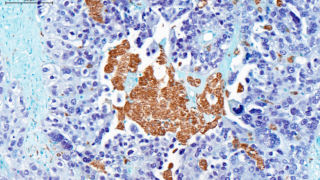Category: General News
Search News
Categories
Archives
Impact of chemotherapy on immune cells in the TME
10th April 2021
Research from Barts Cancer Institute, Queen Mary University of London, has revealed novel insights into the effects of chemotherapy on the tumour microenvironment (TME). The study found that chemotherapy enhances the anti-tumour actions of immune cells within the TME and their ability to support immune responses against cancer.
Read moreCombining research and public engagement
8th April 2021
Fran Balkwill, Professor of Cancer Biology at Barts Cancer Institute, Queen Mary University of London, recently wrote a World View article for the journal Nature Reviews Cancer, discussing her dual career in public engagement and research.
Read moreResearchers use machine learning to rank cancer drugs in order of efficacy
25th March 2021
Researchers from Barts Cancer Institute, Queen Mary University of London, have developed a machine learning algorithm that ranks drugs based on their efficacy in reducing cancer cell growth. The approach may have the potential to advance personalised therapies in the future by allowing oncologists to select the best drugs to treat individual cancer patients.
Read moreOvarian Cancer Perspectives: Q&A with Dr Michelle Lockley
18th March 2021
In recognition of Ovarian Cancer Awareness Month, we spoke with Dr Michelle Lockley, Group Leader and clinical researcher in BCI’s Centre for Cancer Cell and Molecular Biology. Dr Lockley’s research group focuses on improving treatments for women with ovarian cancer, particularly for those whose tumours are resistant to chemotherapy.
Read moreNew class of drug reduces risk of death in bladder cancer
15th February 2021
A new type of drug that helps target chemotherapy directly to cancer cells has been found to significantly increase survival of patients with the most common form of bladder cancer, according to results from a phase III clinical trial led in the UK by Professor Tom Powles from Barts Cancer Institute, Queen Mary University of London and Barts Health NHS Trust.
Read moreSNPnexus in the fight against COVID-19
8th February 2021
Researchers from Barts Cancer Institute, Queen Mary University of London, have released a web-based tool called SNPnexus COVID to streamline the analysis of host genetic sequencing data and allow for the identification and prioritisation of genetic variants that may impact an individual’s susceptibility to and the severity of COVID-19 infection.
Read more





